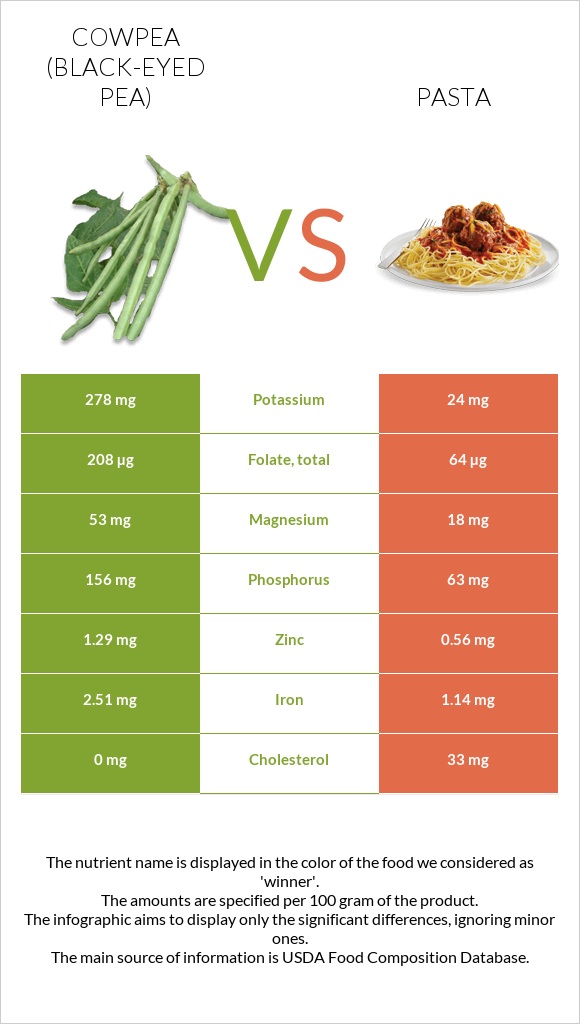Cowpea (Black-eyed pea) vs. Pasta — In-Depth Nutrition Comparison
Compare
What are the differences between cowpea (Black-eyed pea) and pasta?
- Cowpea (Black-eyed pea) is higher in folate, copper, iron, phosphorus, manganese, magnesium, potassium, and zinc, yet pasta is higher in vitamin B2.
- Cowpea (Black-eyed pea)'s daily need coverage for folate is 36% more.
- Cowpea (Black-eyed pea) has 12 times more potassium than pasta. While cowpea (Black-eyed pea) has 278mg of potassium, pasta has only 24mg.
We used Cowpeas, common (blackeyes, crowder, southern), mature seeds, cooked, boiled, without salt and Pasta, fresh-refrigerated, plain, cooked types in this article.
Infographic

Infographic link
Mineral Comparison
Mineral comparison score is based on the number of minerals by which one or the other food is richer. The "coverage" charts below show how much of the daily needs can be covered by 300 grams of the food.
| Contains more MagnesiumMagnesium | +194.4% |
| Contains more CalciumCalcium | +300% |
| Contains more PotassiumPotassium | +1058.3% |
| Contains more IronIron | +120.2% |
| Contains more CopperCopper | +188.2% |
| Contains more ZincZinc | +130.4% |
| Contains more PhosphorusPhosphorus | +147.6% |
| Contains less SodiumSodium | -33.3% |
| Contains more ManganeseManganese | +112.1% |
| Contains more SeleniumSelenium | +∞% |
Vitamin Comparison
Vitamin comparison score is based on the number of vitamins by which one or the other food is richer. The "coverage" charts below show how much of the daily needs can be covered by 300 grams of the food.
| Contains more Vitamin CVitamin C | +∞% |
| Contains more Vitamin EVitamin E | +∞% |
| Contains more Vitamin B5Vitamin B5 | +124.6% |
| Contains more Vitamin B6Vitamin B6 | +194.1% |
| Contains more Vitamin KVitamin K | +∞% |
| Contains more FolateFolate | +225% |
| Contains more Vitamin AVitamin A | +500% |
| Contains more Vitamin B2Vitamin B2 | +172.7% |
| Contains more Vitamin B3Vitamin B3 | +100.4% |
| Contains more Vitamin B12Vitamin B12 | +∞% |
All nutrients comparison - raw data values
| Nutrient |  |
 |
DV% diff. |
| Folate | 208µg | 64µg | 36% |
| Fiber | 6.5g | 26% | |
| Copper | 0.268mg | 0.093mg | 19% |
| Iron | 2.51mg | 1.14mg | 17% |
| Phosphorus | 156mg | 63mg | 13% |
| Cholesterol | 0mg | 33mg | 11% |
| Manganese | 0.475mg | 0.224mg | 11% |
| Magnesium | 53mg | 18mg | 8% |
| Potassium | 278mg | 24mg | 7% |
| Zinc | 1.29mg | 0.56mg | 7% |
| Vitamin B2 | 0.055mg | 0.15mg | 7% |
| Vitamin B12 | 0µg | 0.14µg | 6% |
| Choline | 32.2mg | 6% | |
| Protein | 7.73g | 5.15g | 5% |
| Selenium | 2.5µg | 5% | |
| Vitamin B5 | 0.411mg | 0.183mg | 5% |
| Vitamin B6 | 0.1mg | 0.034mg | 5% |
| Vitamin B3 | 0.495mg | 0.992mg | 3% |
| Calcium | 24mg | 6mg | 2% |
| Vitamin E | 0.28mg | 2% | |
| Calories | 116kcal | 131kcal | 1% |
| Fats | 0.53g | 1.05g | 1% |
| Carbs | 20.76g | 24.93g | 1% |
| Vitamin A | 1µg | 6µg | 1% |
| Vitamin B1 | 0.202mg | 0.209mg | 1% |
| Vitamin K | 1.7µg | 1% | |
| Polyunsaturated fat | 0.225g | 0.429g | 1% |
| Vitamin C | 0.4mg | 0mg | 0% |
| Net carbs | 14.26g | 24.93g | N/A |
| Sugar | 3.3g | N/A | |
| Sodium | 4mg | 6mg | 0% |
| Saturated fat | 0.138g | 0.15g | 0% |
| Monounsaturated fat | 0.044g | 0.124g | 0% |
| Tryptophan | 0.095mg | 0.065mg | 0% |
| Threonine | 0.294mg | 0.134mg | 0% |
| Isoleucine | 0.314mg | 0.197mg | 0% |
| Leucine | 0.592mg | 0.348mg | 0% |
| Lysine | 0.523mg | 0.097mg | 0% |
| Methionine | 0.11mg | 0.079mg | 0% |
| Phenylalanine | 0.451mg | 0.247mg | 0% |
| Valine | 0.368mg | 0.217mg | 0% |
| Histidine | 0.24mg | 0.103mg | 0% |
Macronutrient Comparison
Macronutrient breakdown side-by-side comparison
Protein:
7.73 g
Fats:
0.53 g
Carbs:
20.76 g
Water:
70.04 g
Other:
0.94 g
Protein:
5.15 g
Fats:
1.05 g
Carbs:
24.93 g
Water:
68.56 g
Other:
0.31 g
| Contains more ProteinProtein | +50.1% |
| Contains more OtherOther | +203.2% |
| Contains more FatsFats | +98.1% |
| Contains more CarbsCarbs | +20.1% |
~equal in
Water
~68.56g
Fat Type Comparison
Fat type breakdown side-by-side comparison
Saturated fat:
Sat. Fat
0.138 g
Monounsaturated fat:
Mono. Fat
0.044 g
Polyunsaturated fat:
Poly. Fat
0.225 g
Saturated fat:
Sat. Fat
0.15 g
Monounsaturated fat:
Mono. Fat
0.124 g
Polyunsaturated fat:
Poly. Fat
0.429 g
| Contains more Mono. FatMonounsaturated fat | +181.8% |
| Contains more Poly. FatPolyunsaturated fat | +90.7% |
~equal in
Saturated fat
~0.15g





